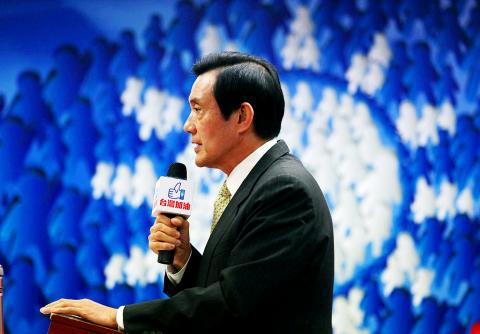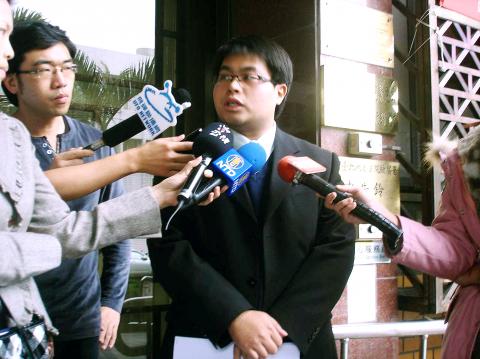The Democratic Progressive Party (DPP) yesterday filed a lawsuit against Premier Wu Den-yih (吳敦義) for his comments accusing DPP presidential candidate Tsai Ing-wen (蔡英文) of corruption.
The party said it filed the lawsuit because Wu, who is on leave to concentrate on his campaign as President Ma Ying-jeou’s (馬英九) running mate, had violated the Presidential and Vice Presidential Election and Recall Act (總統副總統選舉罷免法) by spreading a rumor or false statement for the purpose of getting a candidate elected or impeding a candidate’s election chances.
At a campaign rally on Friday, Wu accused Tsai of corruption in the so-called “Yu Chang case” during her time as vice premier in 2007, when she approved separate government investments of NT$875 million (US$28.8 million) and US$20 million — about NT$1.4 billion in total — for the bio-technology start-up before leaving office and serving as Yu Chang’s chairperson.

Photo: CNA
The National Development Fund’s (NDF) investment in Yu Chang was a lot less than NT$1.4 billion and Wu’s comments were an “obvious smear,” DPP spokesman Chuang Ruei-hsiung (莊瑞雄) said.
The NDF deposited its initial investment of NT$264 million in Yu Chang,now known as TaiMed Biologics Co, and approved the second phase investment of NT$875 million in March 2008, but the second deposit never went through after the change in government in May 2008, he said.
“No matter how you calculate it, the sum would not be NT$1.4 billion,” Chuang said.

Photo: Lin Chun-hung, Taipei Times
Wu failed to get the time right either because the NT$875 million investment was approved by the NDF in March 2008, 10 months after Tsai left office in May 2007, DPP lawyer Huang Di-ying (黃帝穎) said.
Huang said it was strange that Wu’s comments came after his wife, Tsai Ling-yi (蔡令怡), had apologized for citing incorrect information at a KMT rally on Dec. 11 to accuse Tsai Ing-wen of transferring NT$1.1 billion in public funds to the accounts of her family’s businesses.
Including Wu, the DPP has now filed lawsuits against eight KMT politicians or political analysts over the Yu Chang case since Wednesday as the party insisted Tsai was not involved in any wrongdoing.
The DPP sued Council for Economic Planning and Development (CEPD) Minister Christina Liu (劉憶如) over allegedly forging documents that were used to smear Tsai and KMT legislators Chiu Yi (邱毅), Hsieh Kuo-liang (謝國樑), Lin Yi-shih (林益世) and Hung Hsiu-chu (洪秀柱), as well as political commentator Clara Chou (周玉蔻), for spreading rumors.
At a separate setting yesterday, DPP legislative candidate Juan Chao-hsiung (阮昭雄) filed a lawsuit with the Taipei District Prosecutors’ Office against Hon Hai chairman Terry Gou (郭台銘), alleging recent remarks by Gou may have violated election laws.
Juan, who represents the party in Taipei’s Wenshan District (文山), said Gou had said he supported Ma’s election and added that he planned to hire charter flights to return his staff from China to vote.
Juan said such measures could constitute vote buying.
Gou also joined a campaign rally for independent legislative candidate Lin Pin-kuan (林炳坤) on Penghu and told Lin that if he was elected, he would invest in a film company to make a movie in Penghu and that he would also provide funds so National Penghu University of Science and Technology could send people to attend the world energy investment competition, Juan said.
Those remarks also might have broken vote-buying regulations, Juan said.
Additional reporting by Rich Chang

Taiwan is stepping up plans to create self-sufficient supply chains for combat drones and increase foreign orders from the US to counter China’s numerical superiority, a defense official said on Saturday. Commenting on condition of anonymity, the official said the nation’s armed forces are in agreement with US Admiral Samuel Paparo’s assessment that Taiwan’s military must be prepared to turn the nation’s waters into a “hellscape” for the Chinese People’s Liberation Army (PLA). Paparo, the commander of the US Indo-Pacific Command, reiterated the concept during a Congressional hearing in Washington on Wednesday. He first coined the term in a security conference last

Prosecutors today declined to say who was questioned regarding alleged forgery on petitions to recall Democratic Progressive Party (DPP) legislators, after Chinese-language media earlier reported that members of the Chinese Nationalist Party (KMT) Youth League were brought in for questioning. The Ministry of Justice Investigation Bureau confirmed that two people had been questioned, but did not disclose any further information about the ongoing investigation. KMT Youth League members Lee Hsiao-liang (李孝亮) and Liu Szu-yin (劉思吟) — who are leading the effort to recall DPP caucus chief executive Rosalia Wu (吳思瑤) and Legislator Wu Pei-yi (吳沛憶) — both posted on Facebook saying: “I

Sung Chien-liang (宋建樑), who led efforts to recall Democratic Progressive Party (DPP) Legislator Lee Kun-cheng (李坤城), was released on bail of NT$80,000 today amid outcry over his decision to wear a Nazi armband to questioning the night before. Sung arrived at the New Taipei District Prosecutors’ Office for questioning in a recall petition forgery case last night wearing a red armband bearing a swastika, carrying a copy of Adolf Hitler’s Mein Kampf and giving a Nazi salute. Sung left the building at 1:15am without the armband and covering the book with his coat. Lee said today that this is a serious

A mountain blaze that broke out yesterday morning in Yangmingshan National Park was put out after five hours, following multi agency efforts involving dozens of fire trucks and helicopter water drops. The fire might have been sparked by an air quality sensor operated by the National Center for High-Performance Computing, one of the national-level laboratories under the National Applied Research Laboratories, Yangmingshan National Park Headquarters said. The Taipei City Fire Department said the fire, which broke out at about 11am yesterday near the mountainous Xiaoyoukeng (小油坑) Recreation Area was extinguished at 4:32pm. It had initially dispatched 72 personnel in four command vehicles, 16